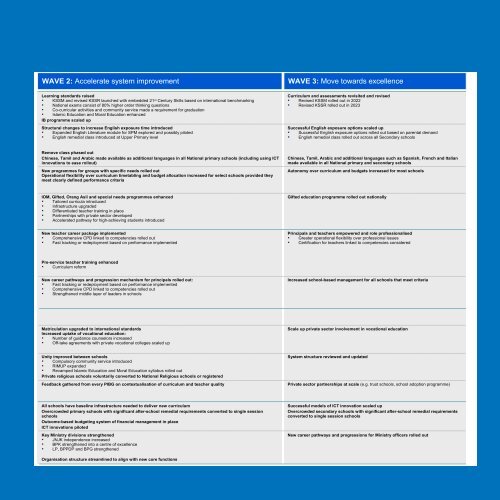Preliminary-Blueprint-Eng
Preliminary-Blueprint-Eng
Preliminary-Blueprint-Eng
Create successful ePaper yourself
Turn your PDF publications into a flip-book with our unique Google optimized e-Paper software.
WAVE 2: Accelerate system improvement WAVE 3: Move towards excellence<br />
Learning standards raised<br />
▪ KSSM and revised KSSR launched with embedded 21 st Century Skills based on international benchmarking<br />
▪ National exams consist of 80% higher order thinking questions<br />
▪ Co-curricular activities and community service made a requirement for graduation<br />
▪ Islamic Education and Moral Education enhanced<br />
IB programme scaled up<br />
Structural changes to increase <strong>Eng</strong>lish exposure time introduced<br />
▪ Expanded <strong>Eng</strong>lish Literature module for SPM explored and possibly piloted<br />
▪ <strong>Eng</strong>lish remedial class introduced at Upper Primary level<br />
Remove class phased out<br />
Chinese, Tamil and Arabic made available as additional languages in all National primary schools (including using ICT<br />
innovations to ease rollout)<br />
New programmes for groups with specific needs rolled out<br />
Operational flexibility over curriculum timetabling and budget allocation increased for select schools provided they<br />
meet clearly defined performance criteria<br />
IOM, Gifted, Orang Asli and special needs programmes enhanced<br />
▪ Tailored curricula introduced<br />
▪ Infrastructure upgraded<br />
▪ Differentiated teacher training in place<br />
▪ Partnerships with private sector developed<br />
▪ Accelerated pathway for high-achieving students introduced<br />
New teacher career package implemented<br />
▪ Comprehensive CPD linked to competencies rolled out<br />
▪ Fast tracking or redeployment based on performance implemented<br />
Pre-service teacher training enhanced<br />
▪ Curriculum reform<br />
New career pathways and progression mechanism for principals rolled out:<br />
▪ Fast tracking or redeployment based on performance implemented<br />
▪ Comprehensive CPD linked to competencies rolled out<br />
▪ Strengthened middle layer of leaders in schools<br />
Matriculation upgraded to international standards<br />
Increased uptake of vocational education:<br />
▪ Number of guidance counselors increased<br />
▪ Off-take agreements with private vocational colleges scaled up<br />
Unity improved between schools<br />
▪ Compulsory community service introduced<br />
▪ RIMUP expanded<br />
▪ Revamped Islamic Education and Moral Education syllabus rolled out<br />
Private religious schools voluntarily converted to National Religious schools or registered<br />
Curriculum and assessments revisited and revised<br />
▪ Revised KSSM rolled out in 2022<br />
▪ Revised KSSR rolled out in 2023<br />
Malaysia Education <strong>Blueprint</strong> 2013 - 2025<br />
Appendix VI: The Education Roadmap<br />
Successful <strong>Eng</strong>lish exposure options scaled up<br />
▪ Successful <strong>Eng</strong>lish exposure options rolled out based on parental demand<br />
▪ <strong>Eng</strong>lish remedial class rolled out across all Secondary schools<br />
Autonomy over curriculum and budgets increased for most schools<br />
Gifted education programme rolled out nationally<br />
Principals and teachers empowered and role professionalised<br />
▪ Greater operational flexibility over professional issues<br />
▪ Certification for teachers linked to competencies considered<br />
Increased school-based management for all schools that meet criteria<br />
Feedback gathered from every PIBG on contextualisation of curriculum and teacher quality Private sector partnerships at scale (e.g. trust schools, school adoption programme)<br />
All schools have baseline infrastructure needed to deliver new curriculum<br />
Overcrowded primary schools with significant after-school remedial requirements converted to single session<br />
schools<br />
Outcome-based budgeting system of financial management in place<br />
ICT innovations piloted<br />
Key Ministry divisions strengthened<br />
▪ JNJK independence increased<br />
▪ BPK strengthened into a centre of excellence<br />
▪ LP, BPPDP and BPG strengthened<br />
Organisation structure streamlined to align with new core functions<br />
Chinese, Tamil, Arabic and additional languages such as Spanish, French and Italian<br />
made available in all National primary and secondary schools<br />
Scale up private sector involvement in vocational education<br />
System structure reviewed and updated<br />
Successful models of ICT innovation scaled up<br />
Overcrowded secondary schools with significant after-school remedial requirements<br />
converted to single session schools<br />
New career pathways and progressions for Ministry officers rolled out<br />
A-36


